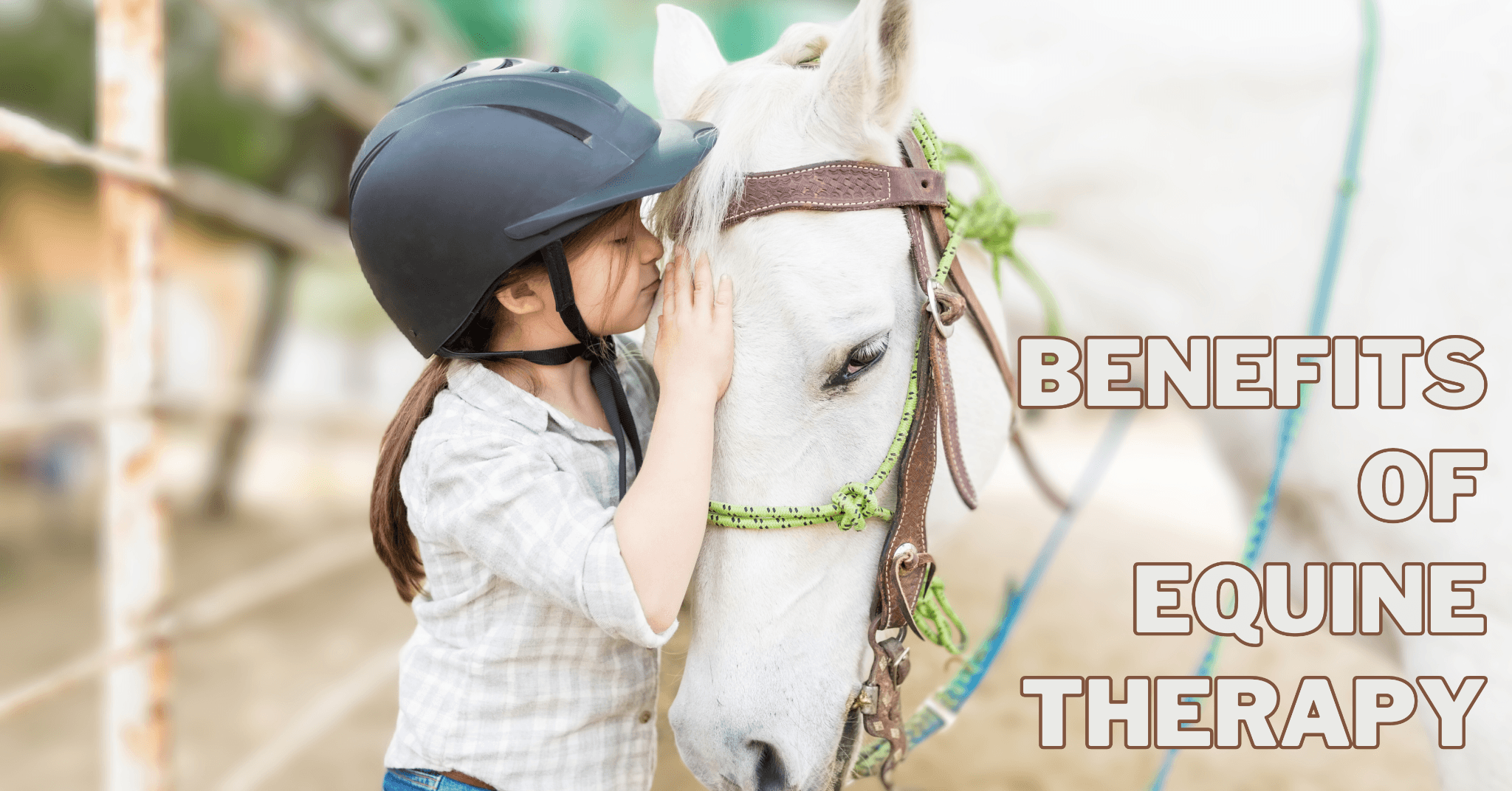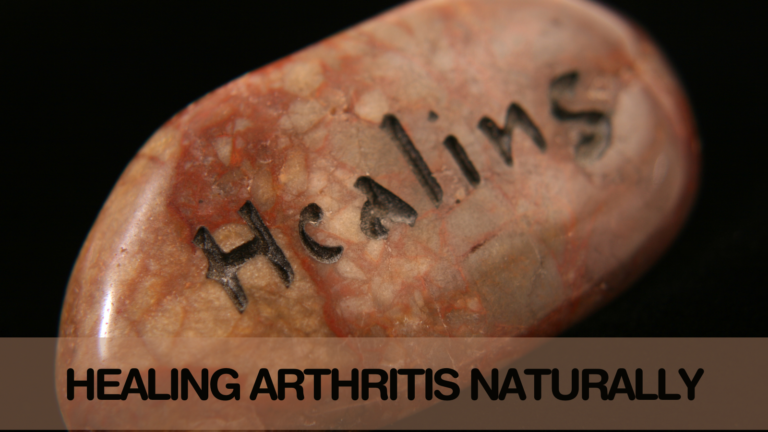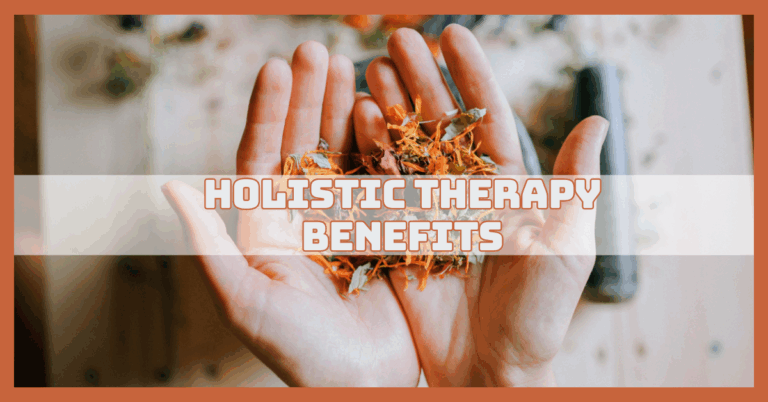Benefits Of Equine Therapy
Benefits Of Equine Therapy
Equine therapy, also known as horse therapy or equine-assisted therapy, is a unique and increasingly popular therapeutic intervention involving interactions with horses to promote physical, emotional, and psychological healing.
This alternative therapy has gained recognition for its numerous benefits and has been successfully used to support individuals of all ages facing various physical, mental, and emotional challenges.
The gentle nature of horses and their ability to connect with humans in profound ways make them ideal partners in therapeutic settings.
In this article, we will explore the diverse benefits of equine therapy and how it has positively impacted the lives of many individuals, offering a source of healing, growth, and empowerment.
From improving communication skills to boosting self-confidence, let's delve into the transformative power of equine therapy and understand how it is becoming an integral part of holistic healing approaches.

What Is Equine Therapy And How Does It Work?
Equine therapy, commonly called horse therapy or equine-assisted therapy, is a therapeutic approach that uses interactions with horses to advance a person's physical, emotional, cognitive, and social well-being.
The therapy occurs in a controlled environment, typically facilitated by trained therapists, counsellors, or horse handlers.
The procedure varies depending on the particular requirements and goals of the person or group receiving horse therapy.
However, common elements often include grooming, feeding, leading, and riding horses.
These activities create opportunities for clients to engage with the animals and develop a unique bond with them.
Horses are known for their ability to sense and respond to human emotions. Interacting with them can provide a safe and non-judgmental space for individuals to express and process their feelings.
Equine therapy can help individuals with anxiety, depression, PTSD, and other mental health conditions.
The responsibility of caring for the horses and the rhythm of working with them can have a calming effect on the mind.
For individuals with physical disabilities or injuries, working with horses can improve balance, coordination, and strength.
Working with horses in groups encourages communication, teamwork, and problem-solving skills.
Successfully handling and interacting with large animals like horses can boost self-esteem and instill a sense of accomplishment.
The horse's natural ability to mirror and respond to human emotions and behaviour allows therapists to observe and interpret clients' responses, providing valuable insights for personalized therapeutic interventions.
Equine therapy is not a substitute for traditional forms of therapy but can be a valuable complement to traditional treatments.
The experience of working with horses in a therapeutic setting can lead to transformative growth and healing, making equine therapy a powerful and holistic approach to supporting individuals on their journey to well-being.
Benefits Of Equine Therapy
Equine therapy, also known as horse therapy or equine-assisted therapy, offers various benefits for individuals facing various physical, emotional, cognitive, and social challenges. Some of the key benefits of equine therapy include:
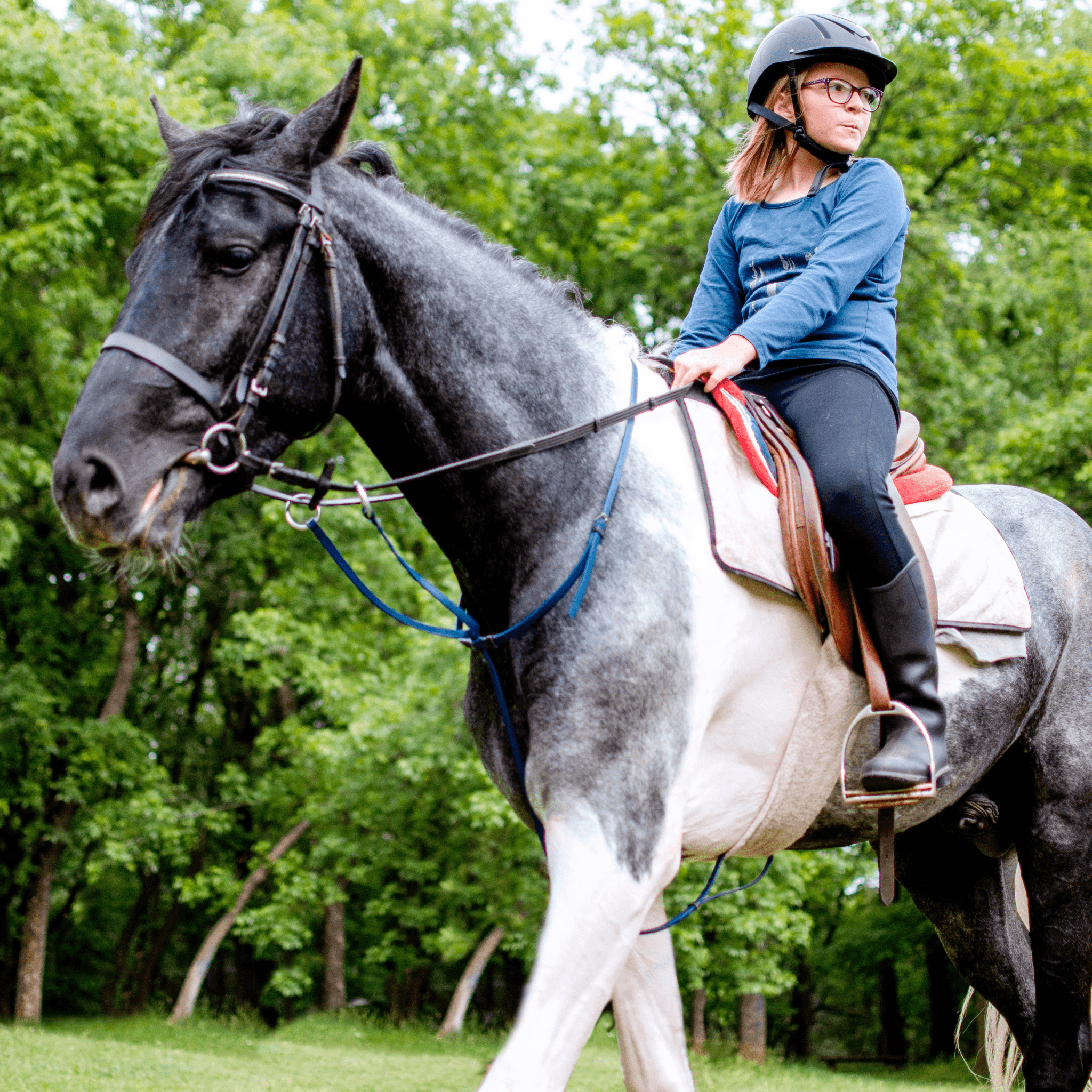
1. Emotional Regulation
In equine therapy, horses act as intuitive and sensitive partners, capable of sensing and responding to human emotions.
As social animals, horses are adept at reading human body language, tone of voice, and subtle cues, which makes them excellent mirrors of our emotional state.
When individuals interact with horses, the animals respond accordingly to the emotional energy they perceive.
For example, if a person feels anxious or tense, the horse may become skittish or alert, also reflecting the person's emotional state.
Through this immediate and honest feedback, clients can better understand their emotions and how they impact their interactions with others.
Horses offer a safe and non-judgmental environment for individuals to practice emotional regulation techniques, such as deep breathing and grounding exercises.
Over time, this therapeutic relationship with horses can help clients develop better emotional awareness and learn effective strategies to manage their feelings, promoting emotional well-being and resilience in their daily lives.
2. Problem-Solving Skills
Equine therapy incorporates various experiential activities with horses, such as navigating obstacle courses or engaging in ground exercises requiring problem-solving and adaptability.
When faced with these tasks, clients must communicate and collaborate effectively with the horse to achieve their goals.
The horse's response to the client's cues may vary, demanding quick thinking and adjustment.
For instance, if a client encounters resistance from the horse while attempting an obstacle, they may need to assess their body language, tone, and cues to understand the horse's reaction and adapt their approach accordingly.
These problem-solving experiences provide valuable lessons in communication, patience, and perseverance.
As clients overcome challenges in partnership with the horse, they gain a sense of accomplishment and enhanced self-confidence.
These problem-solving skills learned in equine therapy can be applied to real-life situations, fostering improved decision-making and resilience in dealing with obstacles and challenges beyond the therapy sessions.
The interactive nature of equine therapy empowers clients to develop problem-solving abilities and reinforces the notion of collaboration and adaptability as keys to success in various aspects of life.

3. Stress Reduction
Equine therapy takes place in tranquil and natural surroundings, providing a peaceful escape from the hustle and bustle of everyday life.
The calming presence of horses and the serene environment can significantly reduce stress levels in participants.
Engaging in activities like horse grooming, riding, or simply being in the presence of these gentle animals can promote a sense of relaxation and tranquillity.
The rhythmic and repetitive movements experienced during horseback riding have been found to have a therapeutic effect on the nervous system, triggering the release of endorphins and promoting a sense of well-being.
The connection between the horse and the client can create a safe and nurturing space, allowing individuals to open up and express their emotions freely.
The non-judgmental nature of horses fosters a sense of emotional safety, encouraging participants to let go of stress and anxiety.
Over time, consistent engagement in equine therapy can improve stress management and cope with life's challenges.
The peaceful and therapeutic environment of equine therapy offers a valuable opportunity for individuals to find respite from the pressures of daily life and cultivate a deeper sense of inner calm and balance.
4. Increased Self-Awareness
Equine therapy fosters a unique and dynamic relationship between the client and the horse, prompting individuals to become more attuned to their emotions and behaviours.
As clients engage in various activities with the horse, they observe how the horse responds to their cues and body language.
This interaction becomes a powerful metaphor for their relationships and communication patterns in everyday life.
Clients may recognize that their emotions or behaviours impact the horse's reactions, leading to moments of self-reflection and introspection.
The horse's non-judgmental and honest feedback encourages clients to confront their strengths, weaknesses, and areas for personal growth.
Through this process, individuals better understand their emotions, triggers, and coping mechanisms.
As they become more self-aware, they gain valuable insights into how their behaviour and attitudes affect their interactions with others.
Equine therapy provides a safe and supportive space for clients to explore their inner selves.
It promotes personal growth and a heightened self-awareness that can lead to positive changes and improved relationships.
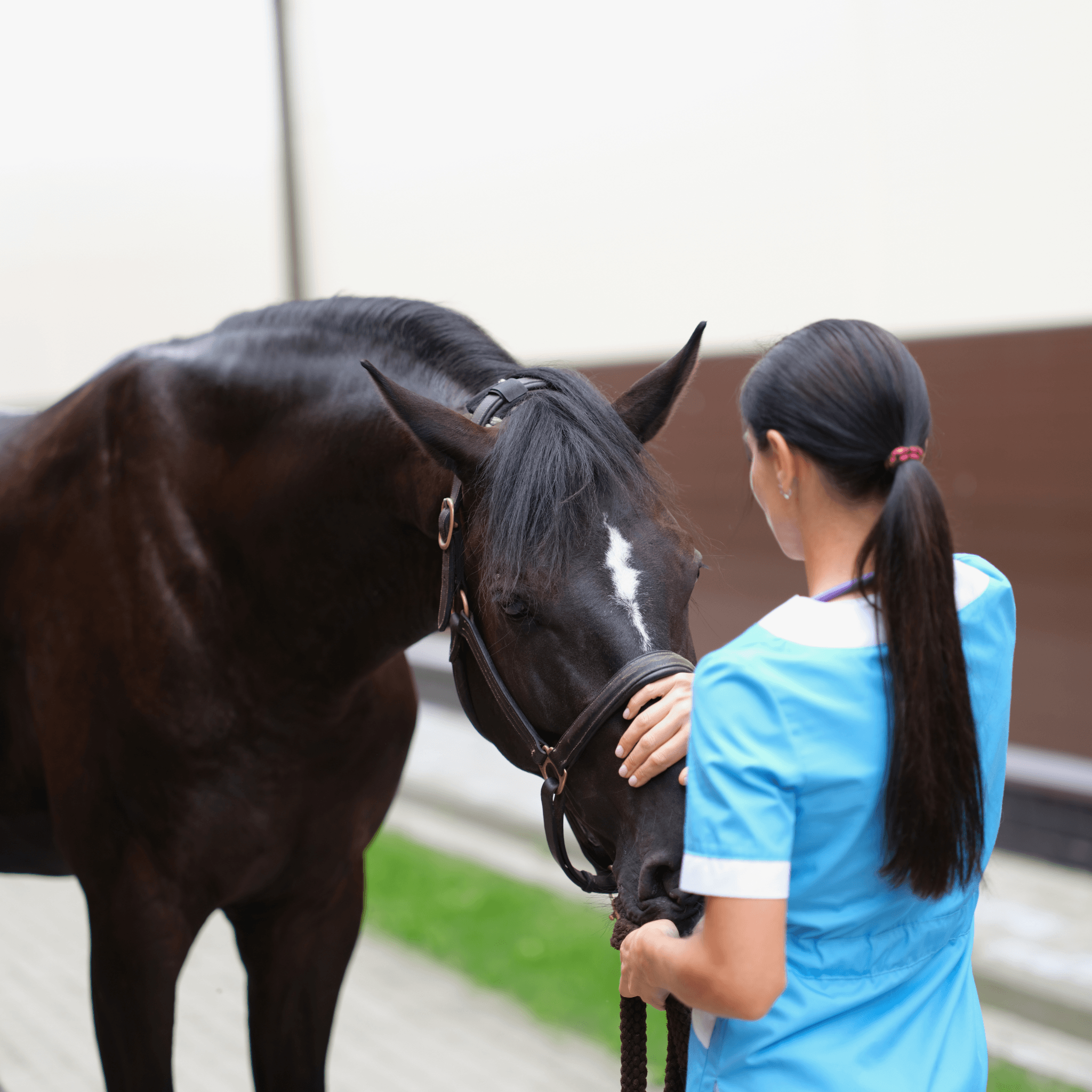
5. Enhanced Communication Skills
Equine therapy emphasizes the importance of clear and effective communication between the client and the horse.
Horses are wise animals and can pick up on subtle non-verbal cues and body language. As individuals engage in activities with the horse, they quickly realize that clear and assertive communication is essential to get the desired response from the horse.
Clients learn to be mindful of their gestures, posture, and tone of voice, as these aspects greatly impact the horse's reactions.
Through this process, individuals become more conscious of their communication style and refine their non-verbal cues to convey their intentions effectively.
The feedback received from the horse serves as a mirror to their communication skills, encouraging clients to become more aware of their strengths and areas for improvement.
These enhanced communication skills extend beyond the therapy sessions and can be applied to various aspects of their lives, including relationships, workplace interactions, and social settings.
Equine therapy provides a powerful platform for individuals to develop confidence in their ability to communicate assertively and authentically, fostering positive and meaningful connections with others.
6. Social Skills Improvement
Equine therapy in a group setting provides a dynamic environment for clients to improve their social skills.
Individuals who work with horses on various activities and tasks naturally engage in social interactions, fostering teamwork and collaboration.
Clients learn to communicate effectively with each other, sharing ideas and coordinating efforts to achieve common goals.
The shared experience of working with the horses creates a sense of camaraderie and mutual support among the participants.
They learn to respect each other's strengths and differences, enhancing their team collaboration ability.
Additionally, group equine therapy sessions offer opportunities for individuals to practice active listening, empathy, and conflict resolution as they navigate challenges together.
The horse's non-judgmental nature and the group's supportive atmosphere encourage clients to be open and authentic in their interactions.
These social skills acquired during equine therapy extend beyond the sessions, positively impacting their social interactions with peers, family, and colleagues.
Equine therapy is a powerful platform for clients to develop strong social bonds, fostering a sense of belonging and emotional support within the group dynamic.

7. Trust And Empathy
Equine therapy offers a unique opportunity for individuals to develop trust and empathy through their interactions with horses.
Horses are sensitive animals and respond to genuine emotions and intentions. As clients engage with the horse, they quickly learn that building trust is a gradual process that requires patience, consistency, and empathy.
Horses can sense fear, anxiety, or uncertainty and respond positively to individuals who approach them with calmness and genuine care.
Clients gain a deeper knowledge of the value of trust in relationships and how their emotions and behaviours can affect the degree of trust they generate with others via this process.
The bond between the client and the horse fosters a sense of connection and emotional intimacy, providing a safe space for clients to practice expressing and receiving empathy.
This newfound sense of trust and empathy can extend beyond the therapy sessions and positively impact their interactions with family, friends, and colleagues.
Equine therapy helps individuals cultivate meaningful and authentic connections, laying the foundation for healthier and more fulfilling relationships in their personal and professional lives.
8. Physical Benefits
Equine therapy offers notable physical benefits, particularly through horseback riding, which can significantly improve balance, coordination, and core strength.
The rhythmic movement of the horse's gait closely resembles the natural motion of walking, making it an ideal therapeutic activity for individuals with physical disabilities or injuries.
As the horse moves, it stimulates the rider's muscles, requiring them to constantly adjust their body position to maintain balance.
This repetitive movement challenges and strengthens the rider's core muscles, helping to improve overall stability and posture.
For individuals with conditions like cerebral palsy, multiple sclerosis, or spinal cord injuries, horseback riding can provide a unique form of physical therapy, promoting increased mobility and range of motion.
The horse's gentle and rhythmic motion improves muscle coordination and joint flexibility.
Additionally, the experience of controlling a large and powerful animal while riding helps individuals develop better body awareness and proprioception.
These physical benefits extend beyond the therapy sessions, potentially enhancing the individual's overall quality of life and physical well-being.

9. Therapeutic Environment
Equine therapy provides an environment where individuals can feel safe and supported in exploring their emotions and experiences.
Horses are known for their non-judgmental and empathetic nature, offering unconditional acceptance to those interacting with them.
This creates a unique and calming space for clients to connect with the horses without fear of criticism or rejection.
In the presence of these gentle and perceptive animals, individuals often feel a sense of emotional security and trust, enabling them to open up and express themselves more freely.
The absence of verbal communication with the horses also eliminates any pressure to speak, making it especially beneficial for those who struggle to articulate their feelings verbally.
The quiet and serene setting of the equine therapy sessions further contributes to the therapeutic environment, promoting relaxation and reducing anxiety.
As individuals engage in activities with the horses, they often experience a deep sense of connection and emotional bonding, fostering acceptance and belonging.
This safe and nurturing atmosphere allows clients to process their emotions, gain insights into their behaviours, and work through challenging issues in a supportive and compassionate environment.
10. Empowerment
Equine therapy can be an empowering experience for individuals as they take an active role in their healing journey.
Working with horses requires clients to leave their comfort zones, face challenges, and develop new skills.
As they engage in various equine activities and exercises, they recognize their strengths, abilities, and potential for growth.
The sense of accomplishment and achievement they feel when successfully communicating with and guiding the horse boosts their self-confidence and self-esteem.
Horses respond to genuine leadership and assertiveness, so as individuals learn to communicate effectively and establish boundaries with the horse, they also develop a sense of control and empowerment over their own lives.
The positive feedback and validation they receive from the horse can be transformative, reinforcing their sense of self-worth and encouraging them to make positive changes in other areas of their lives.
Equine therapy provides a unique opportunity for individuals to connect with a powerful and sensitive animal, creating a sense of partnership and mutual respect.
This partnership, along with the supportive guidance of the equine therapist, fosters a sense of empowerment and personal agency that can lead to transformative growth and lasting change.

11. Coping Mechanisms
Equine therapy offers individuals a unique and experiential way to develop healthy coping mechanisms and stress management skills.
Clients learn to regulate their emotions and responses effectively as they interact with the horses and face various challenges.
Horses are sensitive animals and can pick up on subtle cues from humans, providing immediate feedback on emotional states.
Through this process, individuals gain insight into their emotional responses and learn how to manage stress and anxiety positively.
The calming and serene environment of the equine therapy setting also contributes to developing coping skills.
As clients engage in horse-related activities, such as grooming, riding, or ground exercises, they experience a sense of mindfulness and presence.
This mindfulness practice can be translated into their daily lives, helping them stay grounded and focused during stressful situations.
Equine therapy provides a safe space for individuals to explore and process their emotions, and the supportive guidance of the equine therapist facilitates the development of healthy coping strategies.
By practicing these coping mechanisms in the presence of the horse, individuals build their resilience and gain the confidence to apply these skills in various real-life challenges.
12. Anger Management
Equine therapy can particularly benefit individuals dealing with anger management issues. Interacting with horses offers a safe and non-judgmental space for releasing pent-up emotions in a controlled and constructive manner.
The rhythmic movements of horseback riding can be soothing, helping to reduce feelings of anger and tension.
Through various horse-related activities, such as grooming or ground exercises, clients can learn to recognize triggers for anger and practice self-regulation techniques.
Horses, being highly attuned to human emotions, provide immediate feedback, allowing clients to understand the impact of their emotions on others.
This increased self-awareness helps individuals develop healthier coping strategies when dealing with anger and frustration.
Working with the horses also fosters patience, empathy, and assertive communication, essential skills in managing anger positively and constructively.
Over time, equine therapy can empower individuals to gain better control over their emotions, leading to more harmonious relationships and improved emotional well-being.
Conclusion
In conclusion, equine therapy offers many benefits that can positively impact individuals' physical, emotional, and psychological well-being.
Through the unique bond formed with horses, clients experience a therapeutic environment that fosters trust, empathy, and self-awareness.
The non-judgmental nature of the horses creates a safe space for individuals to explore their feelings and experiences, leading to personal growth and empowerment.
Equine therapy provides a holistic and effective approach to healing, supporting individuals in achieving emotional, physical, and mental well-being through the profound connection and mutual understanding between humans and these majestic animals.
I trust you enjoyed this article on the Benefits Of Equine Therapy. Please stay tuned for more blog posts shortly. Take care!
JeannetteZ
>>>Please click here to read my all-inclusive article about Why Is Wildlife Important And How Can We Protect It<<<
Your Opinion Is Important To Me
Thoughts? Ideas? Questions? I would love to hear from you. Please leave your questions, experiences, and remarks about the Benefits Of Equine Therapy in the comments below. You can also reach me by email at Jeannette@Close-To-Nature.org.
Disclosure
This post may contain affiliate links. As an Amazon Associate and other affiliate programs, I earn from qualifying purchases at no extra cost to you. Please read my full affiliate disclosure.
You might also enjoy these blog posts:
Best Tips To Grow Daffodils In Containers
Best Tips To Grow Marshmallow Roots In Containers
Best Tips To Grow Anemones In Containers

